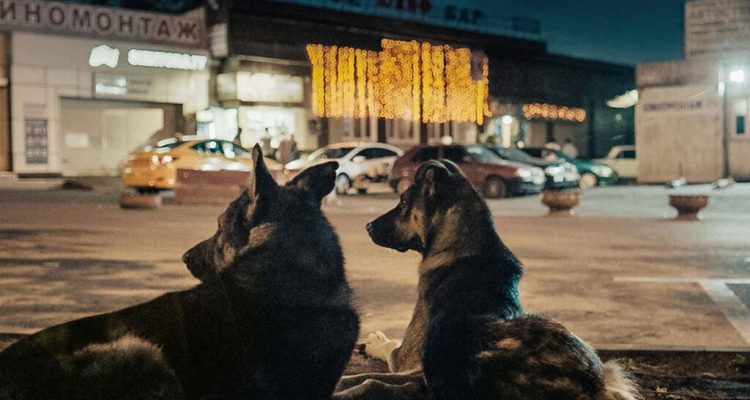Ten minutes of narrative stuffed into a ninety-minute vessel, the new documentary feature “Space Dogs” is an unfocused, half-baked stumble. It would be bad enough if the film were just short on things to say, lacking any cohesive structure, and uncomfortable to look at (all of which is also true), but it is also a dreadful slog lacking anything resembling momentum. Even the worst movies out there often give their audiences a glimpse at something interesting, or the fleeting promise of an idea worth pursuing, yet one can’t hold out hope for anything like that with “Space Dogs,” which seems to struggle to justify its own existence with each frame.
READ MORE: Fall Film Preview: 40 Most Anticipated Films To Watch
Ostensibly the story of the U.S.S.R.’s use of animals during its mid-20th century space program, “Space Dogs” uses sporadic voiceover on top of shots of 21st century Russia to tell its story, such as it is. As the camera lingers on a couple of feral dogs wandering the streets of Moscow, weaving between parked cars and indifferent bystanders tapping away at their cell phones, the narrator relates the history of the first dog the Soviets sent into space. Like the modern dogs the camera follows, Laika was an unclaimed mutt that scientists found on the streets and would later become the first mammal to enter Earth’s orbit when she launched in 1957.
As “Space Dogs” moves past this introductory information, more time is spent in the silent company of the 21st century street dogs, who the film follows as they hustle for scraps of food all over Moscow. Archival footage of Laika and the other animals used for the space program’s testing break up the monotony of these scenes, which grow increasingly graphic and uncomfortable to watch as the documentary progresses. Directors Elsa Kremser and Levin Peter seem to be making a passive case that human and canine barbarism exist on similar levels, with the behavior of the dogs and archival footage of scientists working with their furry ancestors buffering the painfully long tracking shots of Moscow’s mean canine streets.
Grainy footage of Russian scientists taking blood samples and carving up the still-living canines ahead of their space launch is only moderately less unpleasant than watching the 21st century counterparts chase and kill a street cat (a scene that goes on for what feels like an eternity). The film bounces back and forth between the two timelines in what appears to be an attempt to connect the two thematically, yet it’s a terrible thing to behold. Indeed, as “Space Dogs” continues to stagger towards its poorly conceived finish line, one starts to realize that all this distasteful footage is leading nowhere.
Animal testing is a very difficult subject to explore, for on the face of the matter, inflicting pain and suffering on captive animals seems the definition of cruelty. On the other hand, research to identify viral strains often requires primates for testing, whose deaths lead to life-saving medicine for millions. The space program demanded similar sacrifices, and while it is legitimate to debate whether causing suffering on a living creature is worth any scientific advancement, the accomplishments of those involved seems to at least justify a counter argument.
No such consideration or discussion is bandied about in “Space Dogs,” however, reliant as it is on banal footage of dogs to carry the ten or so minutes of information it presents via voiceover. It is tedious, and as things progress, becomes increasingly difficult to watch or justify. Stream of consciousness reflections on the use of turtles following dogs in the Soviet program, and how that connects to ancient creation mythology sidetracks things further, as do the shots of 21st century turtles wandering Moscow.
It honestly feels like Kremser and Peter got money to make a documentary about dogs, Wikipedia’d some basic facts, then wandered Moscow for some B-roll to play over the handful of minutes worth of dialogue that tumbled out of them between beers and bong tokes. When even this basic level of half-assery left them twenty minutes short of ninety, they appear to have gotten some turtles from a friend or pet store to make up the deficiency. Granted, it likely didn’t transpire just like that, but one can’t help a person for cobbling together that narrative in the absence of any on-screen.
Less of a documentary feature and more like some confused attempt at a tax dodge masquerading as cinema, “Space Dogs” isn’t worth the paper the money wasted on its production is printed on. Lacking any thematic direction or narrative momentum, the film wanders around like so many Muscovite strays on the streets of Russia: aimless yet not exactly lost. A tough sit on top of all this, and lacking anything resembling a coherent point, this one should be shot into space without a return trajectory. [F]

